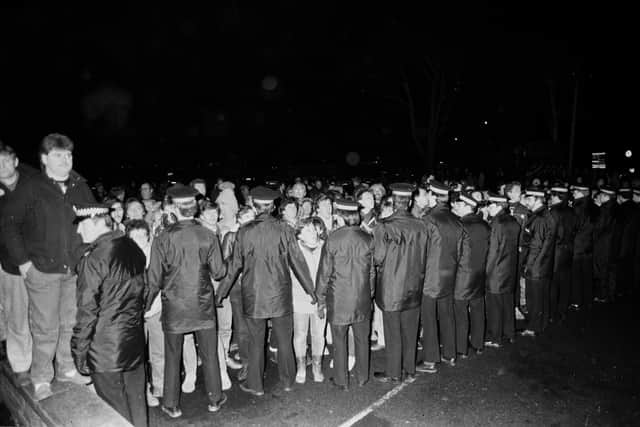Consultation finds overwhelming support for pardon for Scottish miners convicted during 1984/85 strike
and live on Freeview channel 276
Let us know what you think and join the conversation at the bottom of this article.
A huge 87 per cent of responses backed the call for miners found guilty of breach of the peace to be given an automatic pardon and 86 per cent said the same about breach of bail convictions.
People commented that the miners had been fighting to protect their jobs and communities through lawful strike action and picketing activities, the strike represented a very particular time in history when miners were “desperate”, “feelings ran high” and the government’s response to the strike had been politically motivated, with policing of it “heavy handed”, “disproportionate” or “provocative”.
Advertisement
Hide AdAdvertisement
Hide Ad

Many argued that the prosecution of miners for breach of the peace was part of a politically-driven strategy to defeat the strike.
One person responded: “Breach of the peace was the default charge for bringing miners to court. I was found guilty of breach of the peace for shouting ‘scab’ at a working miner.”
Another said: “Many miners were picked out at random from picket lines and charged with breach of the peace when in fact they had done nothing wrong.”
And it was argued that bail conditions had been used as a way of controlling miners who had been arrested, although not convicted, stopping them from joining a picket line or taking part in other union activity.
Advertisement
Hide AdAdvertisement
Hide AdAn estimated 1,400 miners in Scotland were arrested during the 1984-85 strike and more than 500 convicted of some offence. Many were dismissed as a result and were blacklisted by employers. For decades they had to bear the brunt of a criminal record for what campaigners say were “trumped up charges”.
An independent review led by human rights lawyer John Scott QC, published last October, recommended a collective pardon for miners convicted of breach of the peace or breach of bail during the bitter dispute.
The then Justice Secretary Humza Yousaf accepted the recommendations and promised legislation, noting that more than three decades on experiences during the strike had left deep scars in many communities.
The strike was about plans to close pits across the UK and despite denials, official papers released later confirmed miners’ leader Arthur Scargill had been right when he claimed the National Coal Board wanted to shut 70 mines with the loss of 70,000 jobs.
Advertisement
Hide AdAdvertisement
Hide AdPrime Minister Margaret Thatcher referred to striking miners as "the enemy within" and Cabinet papers revealed discussions about how to "stiffen the resolve of chief constables" and press courts to speed up cases so miners saw their workmates being punished.
And she took a particular interest in the action in Scotland. Minutes of a Cabinet sub-group chaired by Mrs Thatcher on May 8, 1984 noted: "It was not clear whether the Scottish Chief Constables were prepared to go as far as their English counterparts to prevent pickets from going to the scene of a possible disturbance.”
Former Lothian Labour MSP Neil Findlay, who campaigned for a pardon, welcomed the consultation results as “great news”. He said: “There is clear and overwhelming support for a full pardon for all who were unfairly convicted during the strike. I now look forward to the Scottish Parliament passing the necessary legislation at the earliest opportunity.”
A message from the Editor:
Thank you for reading this article. We're more reliant on your support than ever as the shift in consumer habits brought about by coronavirus impacts our advertisers.
If you haven't already, please consider supporting our trusted, fact-checked journalism by taking out a digital subscription.
Comment Guidelines
National World encourages reader discussion on our stories. User feedback, insights and back-and-forth exchanges add a rich layer of context to reporting. Please review our Community Guidelines before commenting.
